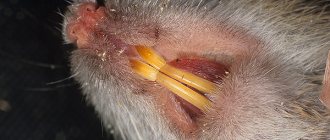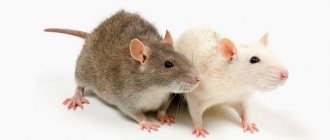Rats are considered quiet animals, but this is far from the truth. They can make a wide variety of sounds, which often impress people.
Pet rats make all sorts of noises that can sometimes sound a little strange. With these sounds they try to let the owner know about something: joy, anger, irritation or poor health. As a rat owner, it is very important for you to know the difference between these noises. This will help you understand your pet better.
What sounds do domestic and wild rats make?
Under natural conditions, rodents live in colonies and communicate in three complementary ways:
- High frequency sounds. Used by cubs to find their mother or by males during the mating season. The human ear is not able to recognize this signal.
- Chirping. Rapid rhythmic chattering of teeth is used to warn relatives of approaching danger. A domestic rat can also chirp if it is scared.
- Smells. They play a key role, since the rat’s sense of smell is more developed than other senses. Wild animals mark their territory with scent glands, and also recognize relatives by a specific smell.
Reference! Rats are myopic, so visual perception does not play a key role for them.
As they became domesticated, people learned to distinguish and identify some of the sounds of their pets.
Dental care and disease prevention
In order for the teeth to develop properly and not deteriorate, the rat needs purified water, so you need to regularly change the liquid in the drinking bowl.
To avoid problems, you need to properly care for your pet. At home, a rat grinds its teeth using special toys, twigs, stones, suitable food (chicken bones, walnuts with shells, bread crumbs)
It is important to provide your pet with access to these materials, otherwise he will start chattering his teeth
If a rodent for some reason (bad bite, lack of materials) cannot grind down its incisors, then they become excessively long and bend at an angle of 80º. Due to excessive length, various problems arise (discomfort, hunger), even death. To avoid this, you need to trim the incisors. This procedure does not cause pain in rats because there are no nerve endings in these teeth.
It is necessary to trim the incisors by 2–3 mm after about 1–2 weeks. You need to monitor their length, because if they outgrow, they will damage the oral mucosa. The incisors are trimmed by a veterinarian; you can also carry out the procedure yourself using nail clippers. You need to hold the animal upside down so that the fragments do not get into the throat. It is necessary to press on the base of the jaw on both sides or unclench them with a stick.
The nippers are held perpendicular to the tooth and cut in one motion.
The health of a rat largely depends on the condition of its teeth, so they need to be checked regularly (especially the incisors). The following symptoms indicate problems:
- wounds on the oral mucosa;
- increased salivation;
- tooth loss;
- knocking when eating food;
- loss of appetite;
- swelling of the tongue or oral mucosa;
- abscess in the mouth.
Any of these symptoms is a reason to contact a ratologist (small rodent specialist). He will conduct a visual examination of the teeth and oral cavity, analyze the microflora from the mouth, and, if necessary, treat the suppuration with antiseptics. Further actions depend on the diagnosis; the dentist can shorten the incisors and correct the bite.
He will also advise you on how to properly care for your rat.
For normal development of the dental system, it is necessary to provide suitable conditions for keeping the rat. You need to monitor the cleanliness of the cage, the quality of food, observe how much the animal sleeps, and protect it from stress and injury.
Squeak
With the help of a piercing loud squeak, the animal tries to convey its fear or pain. Inspect the area around the cage and analyze what might have frightened your pet. It is likely that the rat could hear the cat or the hum of the vacuum cleaner from the next room.
If the rat does not live alone in the cage, put it away. Inspect carefully for bites and injuries. If there are no visible signs of damage on the body, and the pet does not calm down and continues to squeak for a long time, contact your veterinarian immediately. Your pet may experience severe pain due to internal injuries.
A quiet, barely audible squeak from stroking means that the rodent enjoys communicating with the owner.
An abrupt loud squeak when pulled out of the cage signals that the pet is not in the mood to contact a person.
conclusions
There is no need to console yourself with the hope that everything will go away on its own. If the disease is neglected, it will be very difficult to restore the pet’s health and avoid death. If timely assistance is not provided, the animal may die within a few days. Especially if the rat has stopped moving, eating and caring for itself, this is a cause for serious concern. Rush to consult a veterinarian
Sources
- https://homkin.ru/krysy/osobennosti-krys/strannye-zvuki.html
- https://animallittle.ru/zvuki-domashnih-krys.html
- https://litbro.ru/interesnoe/krysinyj-yazyk
- https://komanda89.ru/krysy/krysa-izdaet-strannye-zvuki.html
- https://zverek.org/krysa-tyazhelo-dyshit.html
[collapse]
Can pet rats hiccup?
Hiccups in an animal occur against the background of:
- overeating;
- nervous excitement;
- hypothermia;
- helminthic infestation.
If the case of hiccups is isolated, then there is no need to worry - perhaps the rat has simply eaten too much. If attacks of hiccups occur periodically, then you need to think about changing food and carrying out preventive deworming.
Important! When hiccups are accompanied by heavy, wheezing breathing, take your pet to the vet immediately. There is a high risk of pneumonia or pneumonia. Without proper treatment, this can lead to the death of your pet.
Fights
It has been noticed that rats can box. Typically, two adult males behave this way when they compete for hierarchical status in a rat community. The animals stand on their hind legs and strike each other with their forelimbs.
Researchers confirm that social pyramids are formed within rat clans, headed by alpha males. Fights in which animals measure their strength are typical for this type of rodent. Brawls can occur, for example, when an older young rat asserts its rights to the highest rank in the hierarchy.
Sometimes fights between rodents arise due to intrusion into someone else's territory. Animals jealously protect their habitat. If you add a new inhabitant to the cage of an old-timer rat and do not first introduce the animals in a separate area, a fight cannot be avoided.
Young rats, especially females, get used to newcomers most easily. With adult males the situation is much more complicated; in most cases they begin to measure their strength.
What sounds indicate health problems?
“Pigeon” cooing occurs with various diseases of the respiratory system (colds, rhinitis, runny nose), less often with cardiac dysfunction. The animal needs a veterinary examination and selection of comprehensive treatment.
Grunting sounds can be a sign of a deviated nasal septum, rhinitis, or even pneumonia. But don’t be alarmed in advance—in some cases, the rat may grunt with pleasure. For example, receiving a desired treat or affection from a person.
Tail movements
One of the main indicators of a rat’s mood is the “behavior” of its tail. An attentive observer will be able to accurately determine the emotional state of his pet if he pays attention to the longest part of his body.
Table 2. How to decipher rat tail movements.
| Nature of movement | What does it mean |
| Lightly swings left and right | The rat is in good spirits, glad to see the owner |
| The tail twitches or freezes in a static position, often quite unnatural | Anxiety, defensiveness |
| Swings in both directions, range of motion is quite large | The animal is stressed and very scared. Perhaps the animal is in an inadequate condition |
The behavior of rats in the search mode differs significantly from their behavior in a calm state. At the same time, sick animals can be distinguished by slow movements and a “lifeless” tail dragging along the floor.
A healthy rat is usually very curious. She enjoys exploring her surroundings. If a rodent is interested in something, it usually rises on its hind legs and sucks in air through its nose. The rat's tail is slightly tense and sometimes motionless.
The animal can enthusiastically turn its head while searching for an interesting object. In this state, the rat turns on all external analyzers, examines visible objects, sounds, and smells.
Can a rat scream?
A heart-rending squeal, scream, or, as it is also called, “crying” of a rat is a sign that the animal is very scared or in pain.
If there are no objective reasons for panic, and the pet continues to scream, carefully remove it from the cage and feel its body with your finger. As a rule, when a person touches a sore spot, the rodent begins to scream louder.
Note! In some cases, a rat may experience pain due to internal injuries to the esophagus after eating inappropriate foods.
Screech
A loud squeal or scream as if it is being killed is also called a rat's "cry." It indicates severe pain or fear of the rodent.
As in the case of squeaking, it is necessary to palpate the pet’s body. If, when you touch any place without visible external injuries, the animal begins to scream, you must take it to the veterinarian. Pain can be caused by internal injuries to the digestive tract as a result of feeding foods that are unsuitable for the rodent.
If you find any kind of injury in a rat (skid, cut), you need to provide it with first aid yourself: treat the wound with an antiseptic solution and stop the bleeding.
What sound does a wounded animal make?
May scream, chirp, or remain silent due to painful shock. Most often, domestic rats suffer injuries to their paws: a torn claw, a cut, a splinter, a broken toe or tail, or a pinched tail.
If you find that your pet has injured itself, calm down, don’t panic, give it first aid. Treat the wound with an anti-inflammatory agent. Try to stop the bleeding with hydrogen peroxide.
How to get rid of a rat when you come face to face with it
If a rat squeaks very close and is found in a nightstand or closet, it’s time to catch it. The main thing is not to drive the animal into a corner. In a critical situation, a rat can jump up to 2 meters high. At the same time, they dig into the victim’s face with their claws and teeth, trying to neutralize it. What a person needs to remember once and for all is that a wild rat can only look like a domesticated pet in appearance. In fact, she is aggressive and cunning.
When you see a rat, you don’t need to make sudden movements or get too close to it. It is advisable to catch it in a trap or try to drive it away using a broom or other improvised means. What should not be allowed is her victorious retreat into a hole inaccessible to humans. You need to make sure that the rat is far from home, scare it or completely neutralize it. So, the main thing in the fight against a rat is to detect it. And how to get rid of it is up to you to decide.
The rat makes strange noises: what should I do?
Sounds that are unusual for humans are not always something unnatural. Sometimes a rat tries to attract attention, get a treat, or announce danger in this way. Guided by the description of each sound, you can easily understand what your pet is trying to say.
If you suspect that the animal is unwell and needs medical attention, do not delay visiting the veterinarian.
It’s not difficult to learn to feel your pet’s mood if you give him a couple of hours of free time every day. Follow the habits of the rat, try to understand the logic of its actions. Then you will easily understand the sounds that the rat makes and what it is trying to communicate to you in this way.
Great article 26
Choosing an ultrasonic repellent device
The practice of fighters against rats and mice shows that repellers that cost more than 1,000 rubles work reliably. In the case of these devices, the price quite well reflects the level of quality: cheaper than 1000 rubles, they usually sell obvious junk, sometimes only simulating work by flashing LEDs.
Moreover, special tests were carried out on several dozen devices on basement and free-living rats in abandoned enterprises. It turned out that powerful and more or less reliable means that can repel pests are:
- Chiston 2 (its price is approximately 2,200 rubles);
- Chiston 2 PRO (costs about 2,500 rubles);
- Bioguard (4500 rubles);
- TM-315 (costs more than 10,000 rubles);
- WK-0600 (7500 rubles);
- UZU-03 (costs about 3,000 rubles);
- Spectrum (3500 rubles);
- Tornado 800 (popular device, price approximately 3,500 rubles);
- Tsunami-2 (the cheapest on the list, costs just under 2,000 rubles);
- KQ-202 A (about 8,000 rubles).
The photo below shows the Chiston 2 repeller:
And here is Tornado 800:
These devices are more likely to scare away rats from a large apartment or from a medium-sized private house, from a basement or technical room. However, even they sometimes do not give a visible effect.
On a note
You can also scare a rat using an ultrasonic dog shocker. However, you won’t be able to use this product all the time, since it drains the battery too quickly.
Sometimes devices from the Elektrokot, Grad, and Typhoon brands work, and sometimes they don’t help. They look effective in reviews on YouTube when the device is turned on directly in a mouse cage, but in a large house the power of the repeller may not be enough.
It is also useful to read: Remedies against rats and mice and the nuances of their use at home
The rat purrs (or croaks)
Happy New Year!! I wish you health, fulfillment of desires, good luck.
I treated with baytril and dexamethasone on the recommendation of a doctor - baytril for 10 days, dexamethasone for 3 days. After the first injection, I stopped purring. It all went away for a while, but now it’s the same thing again... I give loratodine and gamavit. Yes, and I noticed that I purr mostly in the evenings. Please tell me, in some human laboratory, eye swabs are mostly taken? Tell me at least which direction to go to find such a laboratory, except for the veterinary clinic.
Only registered users have the ability to start new topics. Register and log in to the site by entering your username and password on the right side of the window, and you can start a new topic.
Before visiting the forum, read the topic: “How to properly consult a veterinarian,” as well as the list of answers to frequently asked questions, this will help you save your time and get an answer to your question faster. Pay special attention to the document: Symptoms of animal diseases. Perhaps in your situation you cannot expect an answer on the forum, but you need to urgently call a doctor or take the animal to a veterinary clinic!
Behavioral features
Rats detect any changes in the owner's voice, so raising your voice or using brute force for punishment is not acceptable. A frightened animal will become downtrodden and wild.
Try turning the guilty rodent onto its back. In nature, such punishment is used by the leader of the pack, so the rat realizes guilt and is filled with respect.
With a good attitude, the pet becomes imbued with love and begins to show talkativeness (coos, chirps, grunts). But even in this case, all sounds have their own interpretation and contain an obligatory subtext.
Meaning of beeps
How does a rat squeak? - extremely diverse. The rather rich tongue of a rodent signals that the animal is afraid, in pain, indignant, happy at the appearance of its owner, etc. The only way for a pet to express its emotions is through sound signals.
In order to know why a rat squeaks, every attentive owner must learn to decipher the sounds made by the pet:
- If a rat screams for a long time or squeals heart-rendingly , it means that it is in great pain. It is necessary to examine the animal and identify the cause of the pain, be it damage from a sharp object or a wound received in a fight with a fellow animal. If there are no external wounds, you need to seek the help of a veterinarian - the internal organs of the rodent may be damaged;
- if the owner hears a hoarse squeak , then the animal is either angry or aggressive. As a rule, such a signal is aimed at intimidating the opponent. At this time, the rat is unlikely to like being disturbed, so you need to give it time to “cool down” and calm down;
- if the animal hisses , then this is also a signal of aggression and hostility. Most likely, it declares to its fellows its territorial rights or the rights to mate with the chosen female;
- if an animal chirps , then it is probably scared and warns community members about potential danger;
- but the pet grunts because it rejoices and experiences complete satisfaction;
- From the same positive emotions, a rodent can grind its teeth ;
If your pet rat squeaks strangely, either coughing or sneezing, it most likely has a cold and the animal needs treatment. In this case, be sure to show the animal to the veterinarian.
Article on the topic: Pregnancy and childbirth of chinchillas: signs, duration, care











